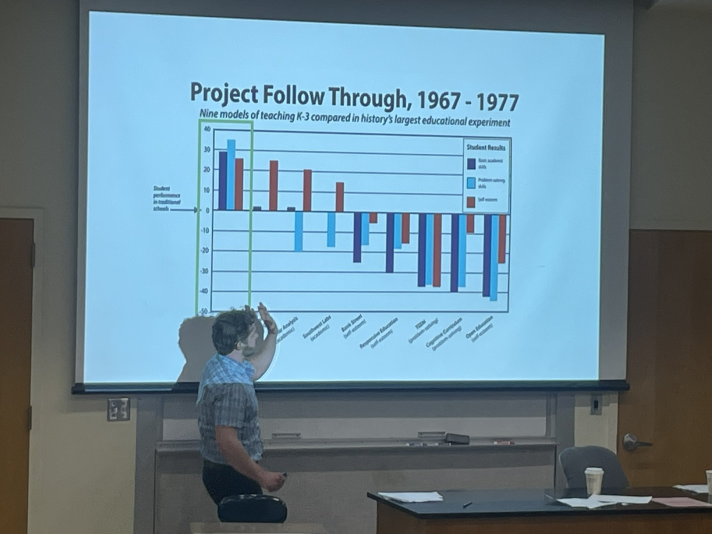Welcome back to Progressively Incorrect, I am your host, Dr. Zach Groshell. This episode is the second of two DI podcast episodes that I am releasing this weekend ahead of the Progressively Incorrect Season 3 finale with Paul Kirschner.
Progressively Incorrect is brought to you by John Catt Educational, which publishes some of the best books in education, including Direct Instruction: A Practitioner’s Handbook, by Kurt Engelmann. You can listen to Kurt talk about his book on Season 3 Episode 7 of this podcast, and it’s perfect for teachers and leaders who want to get their hands on the latest text on Direct Instruction.
Please enjoy this episode of the Direct Instruction Podcast with Casey Sovo.
Listen and subscribe to this podcast on…
Spotify
YouTube
Apple Podcasts
WordPress
Like what you heard and interested in hiring me to do some PD? Get in touch!

Discover more from Education Rickshaw
Subscribe to get the latest posts sent to your email.



Your Podcasts are amazing, and I am so grateful to Anna Stokke for sharing them with me.
LikeLike
Thank you!
LikeLike
Watched a webinar featuring Noel Pearson – an Australian – talking about the affect of DI – very similar, and inspiring to not just teachers of indigenous students.
LikeLiked by 1 person
Independent studies on 25 of Noel Pearson’s Schools are not so positive-
“Findings show that, compared to very remote schools without FLFRPSP, the programme has not improved students’ literacy abilities and results. Attendance rates for intervention schools have declined faster than for non-intervention schools. The paper questions the ethics of policy implementation and the role of evidence as a tool for accountability.”
From- Guenther J, Osborne S (2020). Did DI do it? The impact of a programme designed to improve literacy for Aboriginal and Torres Strait Islander students in remote schools. The Australian Journal of Indigenous Education 1–8. https://doi.org/10.1017/jie.2019.28
LikeLike
Jennifer Buckingham provided a rejoinder to the study you mentioned Guenther J, Osborne S (2020), which in her opinion was flawed.
“Nonetheless, the basic fact that Guenther and Osborne’s (2020) post-intervention data cannot in anyway be accurately described as such is sufficient to call their conclusions about the FLRPS program into question.” A concise read. https://doi.org/10.1017/jie.2020.18
LikeLike
Buckingham’s criticisms was that the National testing (NAPLAN) over a 3 year period did not EXACTLY align with the start and finish of the DI, EDI & SoR program.
However, Buckingham’s affiliation with MultiLit, which received substantial payments from Noel Pearson, raises questions about the independence of her response.
Another independent report from the University of Melbourne, using multi-year NAPLAN data, found no significant improvements in all areas (p. 76):
“Overall, no differences were detected in overall growth on NAPLAN between control and program schools at the national level between 2015 and 2017 on NAPLAN Reading t(272) = 0.43, p = 0.67; NAPLAN Writing t(281) = −1.30, p = 0.19; or NAPLAN Grammar and Punctuation t(284) = 0.35, p = 0.73. However, significant differences were detected for NAPLAN Spelling t(284) = −1.25, p < 0.01”
Notably, spelling scores decreased significantly.
Furthermore, Guenther & Osborne (2020) published a response to Buckingham’s rejoinder in The Australian Journal of Indigenous Education (49, 173–175. https://doi.org/10.1017/jie.2020.19). They conclude,
“In summary, the evidence clearly shows that this investment didn’t do it.”
Given the promotion of Direct Instruction (DI), di, Explicit Direct Instruction (EDI), and Science of Reading (SoR), one would expect substantially better results than these findings indicate.
LikeLike
Kia ora George. Who and what ot believe is a bit of a minefield especially for humble classroom practitioners. Dr Holly Lane addressed this recently https://www.youtube.com/watch?v=scKQCK-UMqM&t=3061s
LikeLiked by 2 people